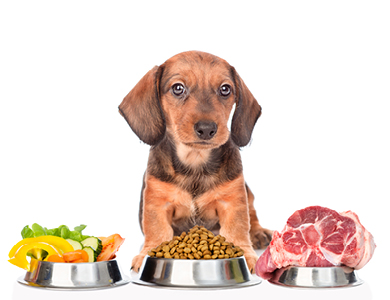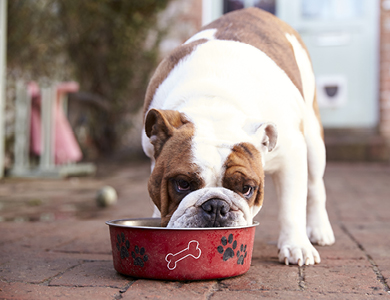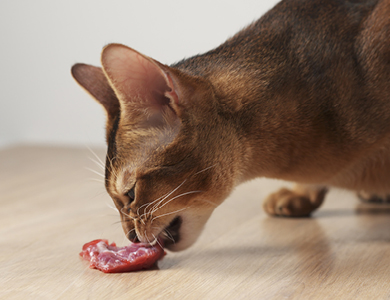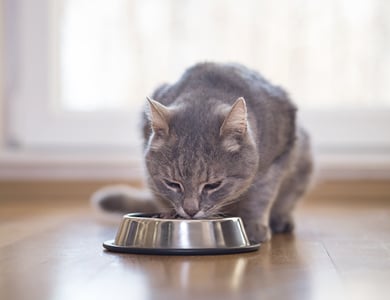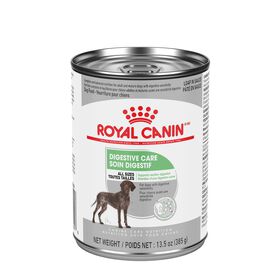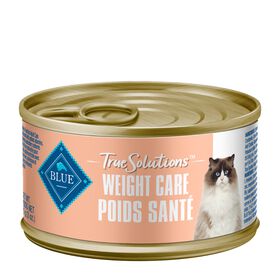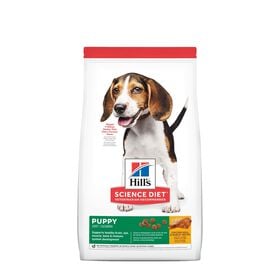Vegetarianism has been gaining popularity in recent years, and people are wondering: what about my pets? There’s been an ongoing discussion about whether or not dogs are carnivores. After all, they are descendants of wolves, so it only makes sense, right? Not quite. The reality is, dogs have been evolving from humans for thousands of years, and as such, have adapted to different foods. So, it would be most accurate to say that your pooch is an omnivore with carnivorous tendencies. This is not, however, the case for the feline pets. Clearly, some clarification is needed!
Dogs are omnivores
In order to remain healthy, your dog’s digestive system breaks down and utilize nutrients from all food categories, whether proteins, fat, carbohydrates (present in starches), or fibres. Provided it contains all the essential amino acids, the source of protein can change without causing any problems. We often give our furry friends chicken, pork and beef, but they can just as easily chow down on eggs, lentils, fish or plant proteins — granted their diet is balanced.
On the other hand, it is not enough to simply give your pet calories proportionate to their weight: you must also ensure they are getting the essential nutrients their bodies need. Any excess can lead to health problems as well as deficiencies.
Let’s talk protein Proteins nourish every cell of the body and help promote growth. The necessary quantity depends largely on the stage of life your pet is in, their level of activity and how healthy they are.
- A lack of protein can lead to:
- slowness marked by weight loss or weight gain;
- a weakening of the immune system;
- gastro-intestinal issues such as diarrhea and vomiting;
- anemia.
- An excess of protein can lead to:
- premature aging;
- energy loss;
- digestive issues;
- slowness marked by weight gain;
- more work for the organs (i.e., kidneys).
The key is to find a balance between what is given and what is actually needed.
Proteins, fats and other nutrients
Proteins are made up of amino acids. The amount of amino acids you give your dog may be sufficient or insufficient depending on the source of protein being used. Meat contains all the essential amino acids, whereas in vegetarian diets, it’s best to combine a number of sources of amino acids to meet your dog’s needs. However, this doesn’t mean simply replacing chicken with leguminous plants: you must still ensure each meal contains everything your dog needs. By striking the right dietary balance, you can provide all your dog’s protein needs without resorting to meat.
It is also crucial to consider the quality of the protein: the nutritional value contained in two separate meals can vary significantly even if the quantity of protein is the same for both. The higher the quality of protein, the more efficiently your pet will digest it, and the more benefits they will reap.
Additional dietary nutrients for omnivorous animals are noted below:
- Fats: protect the vital organs, help in maintaining adequate body temperature, support the immune system and the reproductive system, and promote growth.
- Carbohydrates (starches): simple or complex sugars which are the primary source of energy for the organism. These nutrients are essential to proper biological functioning. They help regulate appetite according to glycemia.
- Fibres: found in fruits and vegetables, fibres must be given in proportions so as to foster optimal intestinal passage while providing the necessary vitamins and minerals.
Cats are carnivores
As for cats, they’re a completely different beast! Putting your cat on an exclusively vegetarian diet is virtually impossible. Because your cat’s system is strictly carnivorous, they need whole animal proteins. Also, protein requirements for cats are largely higher than those of other species.
Part of the reason is that cats don’t produce taurine — an essential amino acid that plays a role in a number of metabolic functions. Taurine is used for maintaining eye health, for instance, as well as heart health, in addition to the nervous, reproductive and immune systems. It’s an amino acid that must absolutely be included in sufficient quantities in your cat’s diet from a young age to avoid any significant health problems. As such, be sure to give them a diet that includes a sufficient level of quality animal proteins — simply put, they need it!
Though there may be some excellent vegetarian options on the market designed for your pup, the same is not true for your precious little kitty. However, these foods can be prescribed for your cat in the event of allergies or dietary restrictions, or even if you simply choose to do so.
Some precautions to take
As always, be sure to talk to your vet before putting your pet on a vegetarian diet. Also, keep in mind that you can always cook food for your pet at home — provided your recipes have been approved by your vet first!
There are a number of vets out there who are specialized in nutrition and capable of creating a balanced diet for your pet. However, the easiest — and safest — option is to use balanced commercial vegetarian foods. This way, you’ll be sure you’re giving them what they need to maintain optimal health. Nonetheless, even though these products can provide all the necessary nutrients for their survival, it’s important to always ask yourself whether it is the best option for them.
Below are two studies that have been done on the subject of animal vegetarianism:
- The first details an experimental no-meat diet in which the hematological characteristics of speed racing sled dogs were preserved.
- The second evaluates vegetarian diets given to cats with feedback from the pet owners.
Important fact: There are currently no scientific studies showing any negative long-term effects.
!! à Lastly, note that this text is provided for informational purposes only. A vegetarian diet may not be what your pet needs. Be sure to discuss this with your vet before making any modifications to your pet’s diet.


